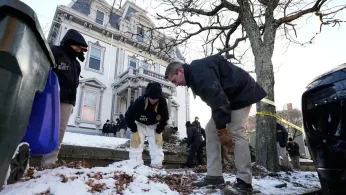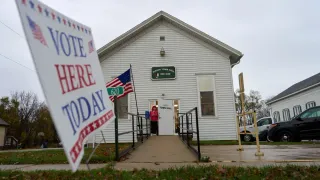
Dec 16
Brown University Shooting Leaves Students, Community Frustrated With Official Response
Helen Wieffering, Byron Tau, Jennifer McDermott and Brian Slodysko READ TIME: 4 MIN.
The ongoing effort to find a man who walked onto Brown University ’s campus during a busy exam season and shot nearly a dozen students in a crowded lecture hall has raised questions about the school's security systems and the urgency of the investigation itself.
A day after Saturday's mass shooting, officials said a person of interest taken into custody would be released without charges, leaving investigators with little actionable insight from the limited security video they had recovered and scrambling to develop new leads.
Law enforcement officials were still doing the most basic investigative work two days after the shooting that killed two students and wounded nine, canvassing local residences and businesses for security camera footage and looking for physical evidence. That's left students and some Providence residents frustrated at gaps in the university’s security and camera systems that helped allow the shooter to disappear.
“The fact that we’re in such a surveillance state but that wasn’t used correctly at all is just so deeply frustrating,” said Li Ding, a student at the nearby Rhode Island School of Design who dances on a Brown University team.
Ding is among hundreds of students who have signed a petition to increase security at school buildings, saying that officials need to do a better job keeping the campus secure against threats like active shooters.
“I think honestly, the students are doing a more effective job at taking care of each other than the police,” Ding said.
Kristy dosReis, chief public information officer for the Providence Police Department, said that at no point did the investigation stand down even after officials appeared to have a breakthrough in the case, detaining a Wisconsin man who they now believe was not involved.
“The investigation continued as the scenes were still active. Nothing was cleared,” said dosReis.
Police and the FBI on Monday released new video and photographs of a man they believe carried out the attack. The man wore a mask in the footage captured before and after the attack.
FBI Boston Special Agent in Charge Ted Docks said a $50,000 reward was being offered for information that would lead to the identification, arrest and conviction of the shooter.
Docks described the investigation, including documenting the trajectory of bullets at the shooting scene, as “painstaking work.”
“We are asking the public to be patient as we continue to run down every lead so we can give victims, survivors, their families and all of you the answers you deserve,” Docks told reporters.
While Brown University is dotted with cameras, there were few in the Barus and Holley building, home of the engineering school that was targeted.
“Reality is, it’s an old building attached to a new one,” Rhode Island Attorney General Peter Neronha told reporters about the lack of cameras nearby.
The lack of campus footage left police seeking tips from the public.
Katherine Baima said U.S. marshals came to her door on Monday, seeking footage from a security camera pointing toward the street.
“This is the first time any of us in my building, as far as I know, had heard from anyone,” Baima said.
Students said the school’s emergency alert system kept them relatively well-informed about the presence of an active shooter. But they were uncertain what to do during a prolonged campus lockdown.
Chiang-Heng Chien, a 32-year-old doctoral student in engineering, hid under desks and turned off the lights after receiving an alert about the shooting at 4:22 p.m. Saturday in a campus lab.
“While I was hiding in the lab, I heard the police yelling outside but my friends and I were debating whether we should open the door, since at that moment the shooter was believed to be (nearby),” he said in a text.
Law enforcement experts say colleges are often at a disadvantage when responding to threats like an active shooter. Their security officers are typically less trained and paid less than in other law enforcement departments. They also don’t always have close partnerships with better-resourced agencies.
Often, funding for campus police departments is not a top priority, even for schools with ample resources, said Terrance Gainer, a former Illinois law enforcement official who later served as the U.S. Senate’s sergeant-at-arms.
“They just aren’t as flush in law enforcement as you would think. They don’t like a lot of uniformed presence, they don’t like a lot of guns around,” said Gainer, who is now a consultant. “Whether it’s Brown or someone else, a key question is, what type of relationship do they have with the local police department?”
At Utah Valley University, where conservative leader Charlie Kirk was assassinated by a shooter on a school building roof last summer, the undersized campus police department never asked neighboring agencies to assist with security at the outdoor Kirk event that attracted thousands, an Associated Press review found.
Providence has an emergency alert system, but it switched from a mobile app to a web-based system in March. The new system requires someone to register online to receive alerts — something not all residents knew.
Emely Vallee, 35, lives about a mile (1.6 kilometers) from Brown with her two young children. She said she received “absolutely nothing” in alerts. She relied instead on texts from friends and the news.
Vallee had expected to be notified through the city’s 311 app, but hadn’t realized that Mayor Brett Smiley phased out the app in March. Smiley said his administration sent out multiple alerts the day of the shooting using the new 311 system and has continued to send them.
Hailey Souza, 23, finished her shift at a smoothie shop just off-campus minutes before the shooting. Everything seemed normal and quiet, Souza said.
But driving home, she saw a boy bleeding on the sidewalk. “Then everyone started running and screaming,” she said. Souza said she saw a bystander rip off his T-shirt to help.
The shop Souza manages, In The Pink, is a block from the engineering building. One of the shooting victims, Ella Cook, was a regular at the store, Souza said. Cook had come in a few days earlier and said her last final was Saturday.
Souza later learned that police came by the store to tell her co-workers about an active shooter. But Souza never received an emergency alert. “Nothing,” she said.






